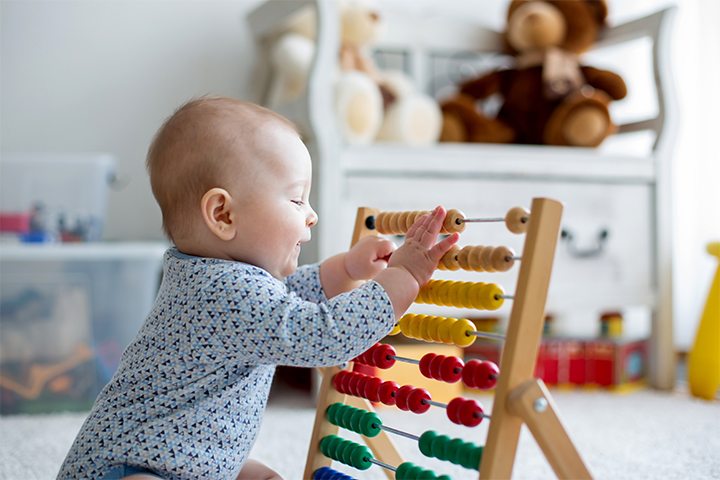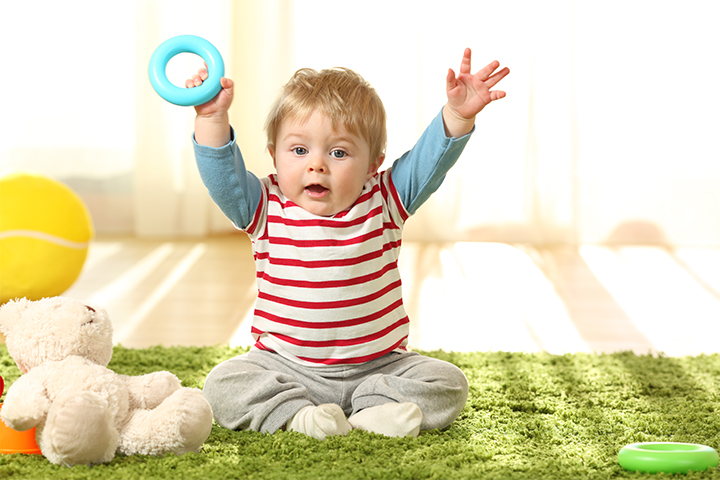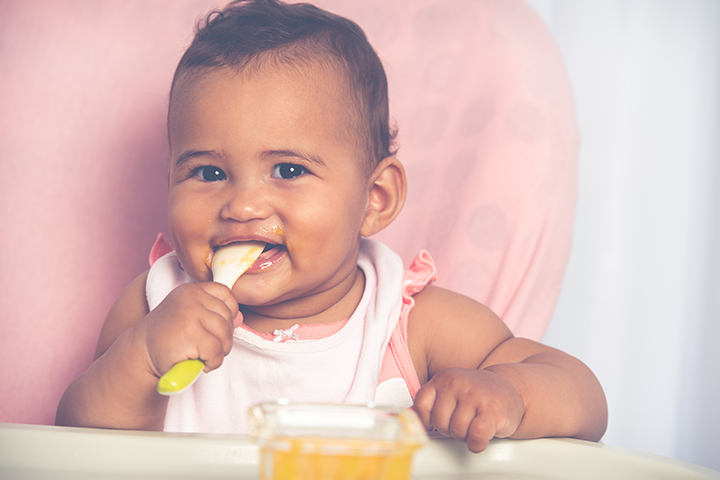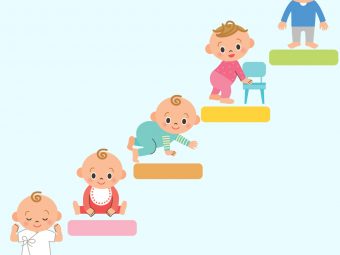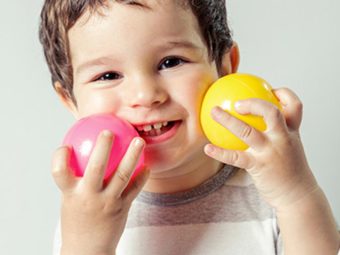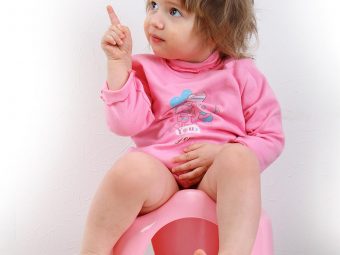
If you look at your 11-month-old baby’s development, you’ll see that they’re approaching the milestone age of one year and are at the crossroads of infantile development. However, at 11 months, they are still considered babies who amaze you every day with new skills.
Babies at this age babble more, stroll around the home with assistance, stand on their own, eat with their hands messily, and seem to have their personalities with their own set of preferences. Therefore, the 11 months age may be rather fascinating.
As you wait for your baby’s first birthday, you might be wondering if he or she has met all of the developmental milestones over the past 11 months. In this post, we’ll go over the key developmental milestones that your baby will achieve at 11 months, as well as how you may contribute to their development.
An 11-Month-Old’s Development Chart
| Achieved Developmental Milestones | Emerging Developmental Milestones |
|---|---|
| Can stand without support, walks with support | Will start taking steps without support |
| Follows basic instructions | Can understand complex instructions and commands |
| Manipulates objects such as toys through nimble fingers | Will develop sharper finger control with wider range of motion |
| Addresses parents with correct noun | Will remember relations and address relatives with correct noun |
| Knows names of personal objects like toys | Can remember the names of other objects in the house |
| Repeats easy and small words | Will speak complex words after hearing them from parents |
| Eats more food items than before | Will develop a keen taste for solid food |
| Recollects familiar faces from a group of strangers | Will greet familiar faces with a smile |
| Displays frustration through basic babbling | Will get vocal about his frustration |
| Remembers the use of some objects | Will start learning the use of several more objects |
An 11-Month-Old Baby’s Developmental Milestones
We have categorized the developmental milestones of an 11-month-old into three parameters:
- Cognitive
- Physical
- Social and emotional
Let’s now see the major landmarks under each of these categories.
Cognitive Developmental Milestones
In this category, we cover the major milestones pertaining to the baby’s cognizance, rationality, and decision-making capabilities.
- Recognizes people by their names: Tell their sibling’s name, and your 11-month-old will be pointing their tiny finger straight towards their sibling. It is the same with household items with simple names and toys that he plays with regularly.
- Explores new ways to play with toys: He now seems to have an advanced play with his toys. Babies at this age can fit an object into a tight-fitting space and then undo it (1). It is a key indicator of the fact that their brains are capable of calculating the shapes and sizes of objects and then manipulate them.
Image: IStock
Your baby will be better at stacking the blocks on top of each other and removing them one by one. Overall, this is an indicator of improved senses of the baby and his ability to coordinate.
- Knows the use of certain objects: He now knows how to drink from a cup and if you have combed his hair several times he will pick up a comb and put straight to his head. An 11-month-old baby can do a basic correlation between objects and their respective purpose if he has repeatedly witnessed their usage.
- Understands “no”: He is making a racket with his rattle. You sternly say “No”, and he promptly stops while looking at you. This works the other way around as well. For example, if he does not like what he is eating, he will turn his head from side to side and say a feeble “No!”. 11-month-olds understand the usage of ‘No’ and are aware that it stands for disapproval for a negative action (2). They will also leverage this word to show their discontent on a matter.
 Do remember
Do remember- Obeys simple instructions: If he understands ‘no’, it means he is bound to comprehend some other instructions as well. For example, babies at 11 months, he can pick and hand over objects when asked to do so. He can also roll and pass the ball when asked. You may have to use some non-verbal cues such as placing your hand in front of him but he will get the point far quickly than ever before.
Image: IStock
- Will repeat simple sounds: Your baby will tend to repeat the words and even sounds that he hears you say (3). Do not expect him to repeat them perfectly. In fact, you may have to strain your ears to understand his words. But, the feat itself is an indicator that his vocal chords are more developed than before.
- Experiments with speech and language: An 11-month-old will experiment with words beyond repetitions. This means he will make subtle sounds of basic vowel and consonant sounds that will sound like gibberish but actually are signs of speech and language development. He will babble some sentences that he may remember hearing you speak.
Physical Developmental Milestones
Here, we will see 11-month-old milestones relating to his physical growth, muscular capabilities, and motor skills.
- Changes positions to reach an object: If it takes him to bend forward to reach an object while seated, then he will do that exactly. The eleventh month old baby takes advantage of all that extra muscle he has in his body to grab objects beyond his reach.
- Stands on his own: Your baby can stand without support. He will be wobbly in the beginning and try to hold on to something to balance, but in most cases, he will stand independently.
 Quick tip
Quick tipImage: IStock
- Walks with support and takes a few steps without support: Your baby will now try to experiment with his legs by taking his first steps using some support. This is referred to as cruising and be prepared for a lot of this. His leg muscles now have the strength to propel him forward. He can be quite an explorer, which brings us to the next developmental milestone.
- Is capable of climbing stairs: No obstacle is too great for your cruising little one. You will notice his first attempts to climb over stairs and other obstacles. He will be clumsy though and will not climb over an array of stairs but will surely scramble over the first step. It is, for this reason, you must baby-proof your house to prevent any hazardous event.
- Makes better use of his fingers: His fingers will develop a better grip than before and it is indicated by the fact that he can hold a spoon and feed himself. You will notice that he now uses his thumb a lot more than before to establish a grip on objects. An 11-month-old baby will also use his fingers and limbs for grasping and moving objects around him to the desired place or position, thanks to improved fine motor skills. You will see the display of these skills in more practical ways like raising his arms while being dressed or undressed.
- Has four teeth: By the age of 11 months, the baby’s gums usually sprout a pair of central incisors both on the lower jaw and the upper jaw (4). Your baby’s smile now looks adorable with two pearly white teeth sticking out from each jaw. Despite the presence of four incisors, your baby is far from chewing solid food since these teeth primarily help in biting than chewing.
- Varied diet and better sleep: He may not have many teeth but he has surely developed a taste for food beyond breast milk. Your baby is no longer exclusively breastfed and now eats a variety of pureed and mashed solid foods in significantly larger quantities than he did before. Along with diet, the other thing that has shown improvement is sleep. Your little one now sleeps more predictably than before usually in large blocks during the night.
Angela, a mother and blogger, shares the sleep patterns of her 11-month-old daughter, Adrianna. She says, “Sleep has made progress in some areas and setbacks in others. First, the good: She is sleeping through the night about 3-4 times per week (knocking on wood here). Now, this doesn’t mean that she doesn’t wake up in the middle of the night, but she’s able to fall back asleep on her own after a brief cry or fuss. It’s awesome, especially after almost a year of getting up between 1-3 times a night (i).”
Sleep Training An 11-Month-Old Baby
- Maintain a regular sleep schedule to create a predictable routine for your 11-month-old.
- Develop a soothing bedtime routine with activities like a warm bath and a bedtime story (5).
- Put your baby in the crib while they are drowsy but not fully asleep to foster the habit of falling asleep independently (6).
- Be consistent in your responses to nighttime awakenings, gradually increasing the time before attending to them (7).
- Allow your baby to practice self-soothing by giving them the opportunity to put themselves back to sleep when they wake up at night.
- Developing healthy sleep habits for your baby requires a combination of patience and consistent efforts over time. Recognize that every baby and family is unique. Choose a strategy that suits your baby’s individual needs, as there is no one-size-fits-all method for sleep training (8).
Image: IStock
Social and Emotional Developmental Milestones
Here are those milestones of his life that relate to his emotional temperament and ability to develop social bonds with people in his life.
- Says ‘mama’ or ‘dada’ to the correct parent: Gone are the days when he would randomly call say “mama” or “dada”. An 11-month-old now knows who the mom is and who the dad, and addresses them with the respective word flawlessly (2). What can be more incredible is that he may call a parent selectively depending on the situation. For example, if he is hungry he may exclaim “mama!” and if he usually plays with father then will call “dada!” when having trouble with some toy.
- Will look for familiar faces in a group of strangers: You are having a family get-together and there is a barrage of relatives visiting you. Expect your baby to spend more time with the ones he knows and remembers from his past. At this age, babies have a sharper memory than they had when they were younger. This is quite evident from the way he interacts with people around him. It is for this reason he may get excited on seeing a familiar face. This form of social interaction helps them forge social bonds with other human beings in their life. On the flip side, he may seem nervous and uncomfortable when offered to be held by a stranger since he does not know and, therefore, does not trust that individual.
Angela recounts her daughter Adrianna was socially at ease at 11 months. She adds, “She is easygoing when being held by new people. She went to a party the other weekend and was held by just about everyone and didn’t seem to care at all.”
- Displays frustration and becomes upset: Here come the tantrums! The 11-month-old babies display a wider range of emotions and do not hesitate to display their displeasure. For example, if it is time to sleep and you take away his toy to coax him to the bed, he may refuse to move and throw a tantrum. He will also display frustration when he is unable to achieve the desired outcome to an action like while playing with a toy.
- Shows his first disobedience: You read that right. Babies at this age can understand instructions while at the same time they are inquisitive. When the two clash, their curiosity and inquisitiveness win and makes them ignore your instructions. For example, if he is trying to break apart a toy and you say “No!” he may pause for a moment, but then continue breaking the toy. He is more determined than ever before and now seems like a resilient little human!
Image: IStock
It is an amusing experience to witness your little 11-month-old develop several life skills. As parents, you can take steps to support your baby in his endeavors.
7 Tips To Improve The Development Of Your 11-Month-Old
Help the baby grow by incorporating these tiny steps in your day-to-day routine with your baby.
- Play fun games and activities: Playtime is the best time to sharpen his new-found skills. Play plenty of games and activities where he can use his fine and gross motor skills and expend his energy more constructively. Taking him to a local park to play with other children and siblings is a nice way to keep the physical development right on track. Encouraging a sense of playfulness during playtime may help foster a positive attitude toward learning and exploration in the future.
- Encourage him to be independent: If he shows interest in eating with a spoon then let him do so. If he loves combing his hair then get a baby comb for him. Your baby can learn new actions and activities only when he is allowed to practice them regularly. Letting him be independent and nurturing the explorer within, is a way of ensuring his development.
- Let him meet new people: Meeting and interacting with new people is a good way of making him more social and comfortable with new faces around. It is also a way of stimulating his memory since he is quite likely to remember people he meets.
- Have meaningful conversations: It is time to cut down on baby talk and have some logical conversations with your little one. The 11-month-old understands instructions and can link words with actions. If you want your baby to improve his basic vocabulary, then speak sentences that are meaningful and are actual conversation points rather than rudimentary baby talk. How does this help? The next point elaborates.
- Reinforce good behavior: Having a meaningful conversation can be the difference between good and not-so-good behavior of an 11-month old baby. Your little one is now developing a personality and the best way to infuse good traits is to reinforce good behavior. For example, if your baby tries to eat food off the floor, dissuade him by giving a stern vocal instruction like “No, don’t do that”. You may also put your hand ahead to say “Give it to me”. Your baby eventually learns that he is not allowed to eat food that fell on the floor. Even though he is far from understanding the real science behind it, your job is done since he is less likely to repeat it.
- Read and narrate stories to him: In the past, you may have relied on picture books but now you can introduce him to simple story books with brightly illustrated images. Sit with him and read these books in a manner that you are narrating the story to him. He may not understand every word but when you are pointing at a familiar image he may try to say its name. This activity will help improve his vocabulary and boost his ability to recall words.
- Encourage independence: While it may seem too early, now is the time to encourage your 11-month old to be independent. This can be simply done by prompting him to do things that he would otherwise ask an adult to do for him. It need not be complicated but simple tasks such as putting his toys in a box or putting his shoes together. These simple activities can lay the foundation for more complex independent activities such as wearing clothes and tying shoelaces. Acquainting him to independence at this age is the best way of making him understand its importance later in life.
The milestones are not uniform for all the babies. Some meet them quite early while some may go slow. While you make an effort to support your baby, you need not have to put pressure on him to learn things. But if the milestones are delayed beyond a reasonable point, it might be a point to worry for you.
Your child must achieve developmental milestones on time. A delay in showing signs of growth could be an indicator of a health issue. Below is a chart indicating the right time for a child’s developmental milestone. As per the chart, a child should be able to turn from back to tummy four to five months after birth. In seven to eight months, the child should be able to stand up with support.
Percentage of 3-4-year-olds enrolled in a preschool (2005-2019)
Source: Heightened Focus on Early Childhood Education Programs as Preschool Enrollment Increased Before COVID-19; US Census Bureau/ACSWhen To Be Concerned?
These red flags could be an outright indicator of some underlying problem.
- Baby is not crawling: About 20% of infants never crawl, and therefore go straight to standing/pull to stand. But at this age, if your baby can barely crawl or take steps, then it should be a matter of concern. A baby may not crawl due to a multitude of reasons ranging from underlying physical deformity to some neurological disorder. Book an appointment with a pediatrician to have your little one checked.
- Cannot stand even when supported: When encouraged with support, a baby will prop himself up to stand on his own feet. Do it a few times and the next thing you know he is standing right next to you. But in case your baby is having trouble standing on his own even when supported then there could be some problem. Observe his legs to make a better inference; if the legs seem shaky and loose when he stands, then it means there is some issue. Visit a doctor immediately.
- Does not utter even a single word: An 11-month-old does not have a flourishing vocabulary but words like ‘mama’ and ‘dada’ are the bare minimum he will speak – with his adorable variations. He will also babble some random words that he hears his parents speak. If a baby does not speak even a single word on, then that is a red flag. Babies with neurological disorders may not speak at the right age.
- Does not respond to basic commands: Your 11-month-old baby now has a stronger grasp at instructional cognizance. This means he will decipher basic instructions and commands quite easily especially if said by a parent. If a baby seems unresponsive, blank or totally disoriented when dictated something, then that is a matter of concern.
- Poor coordination of the senses: Call out to your baby from behind the curtain and he will immediately turn his head towards it. He will keep looking at the curtain since he realizes the source of the voice is behind it. This basic analysis requires a coordination of all the senses and thorough processing by the brain. If your baby shows a poor functioning of his senses, including difficulties with sensory exploration, then it could mean a problem.
Frequently Asked Questions
1. How much water should my 11-month-old drink?
The Centers for Disease Control and Prevention (CDC) recommends that a child between the age of 6-12 months should drink 4-8 ounces of water daily (9).
2. What snacks can I give my 11-month-old?
Children between 6-12 months can be given water, breast milk, or infant formula (9).
3. How much milk does my 11-month-old need?
Babies in between eight and 12 months old can have 6-8 ounces of milk/infant formula, preferably in three to four servings (10).
4. How much is the recommended sleep duration for my 11-month-old?
The National Sleep Foundation recommends 12-15 hours of sleep daily for children between four and 11 months old (11).
5. What is the average weight for an 11-month-old baby?
According to the Centers for Disease Control and Prevention (CDC), the average weight of an 11-month-old ranges from 8 kg to 12.5 kilograms (12).
Most 11-month-olds start making subtle sounds, stand with support, and understand simple instructions. In addition, you may notice that they like experimenting with various food items and begin throwing tantrums. Although these are all part of an 11-month-old baby’s development, do not fret if your baby has not achieved any milestone, be patient and encourage them by conversing, playing, and spending time with them to help attain their milestones. However, it is best to be aware of the red flags and seek expert opinion if you think there is a significant delay in your baby’s development.
Infographic: Tips To Promote The Development Of Your 11-Month-Old
Now that your baby is about to celebrate their first birthday, they should be standing on their feet (literally, so!), making adorable sounds, and loving various flavors of foods. Although all babies may not attain every milestone simultaneously, you may ensure their development by following simple measures in the infographic below. Illustration: Momjunction Design Team
Key Pointers
- Development at 11 months can be categorized into three areas: cognitive, physical, and social-emotional.
- Cognitive development involves identifying people and objects, understanding the function of things, and following simple directions.
- Physical development includes standing and walking unaided, improving finger control, and eating a wider variety of foods.
- Social and emotional development encompasses remembering familiar faces, displaying anger, and recalling how to use things.
- Encouraging play, providing opportunities for discovery, and paying attention to emotional cues can all aid in development.
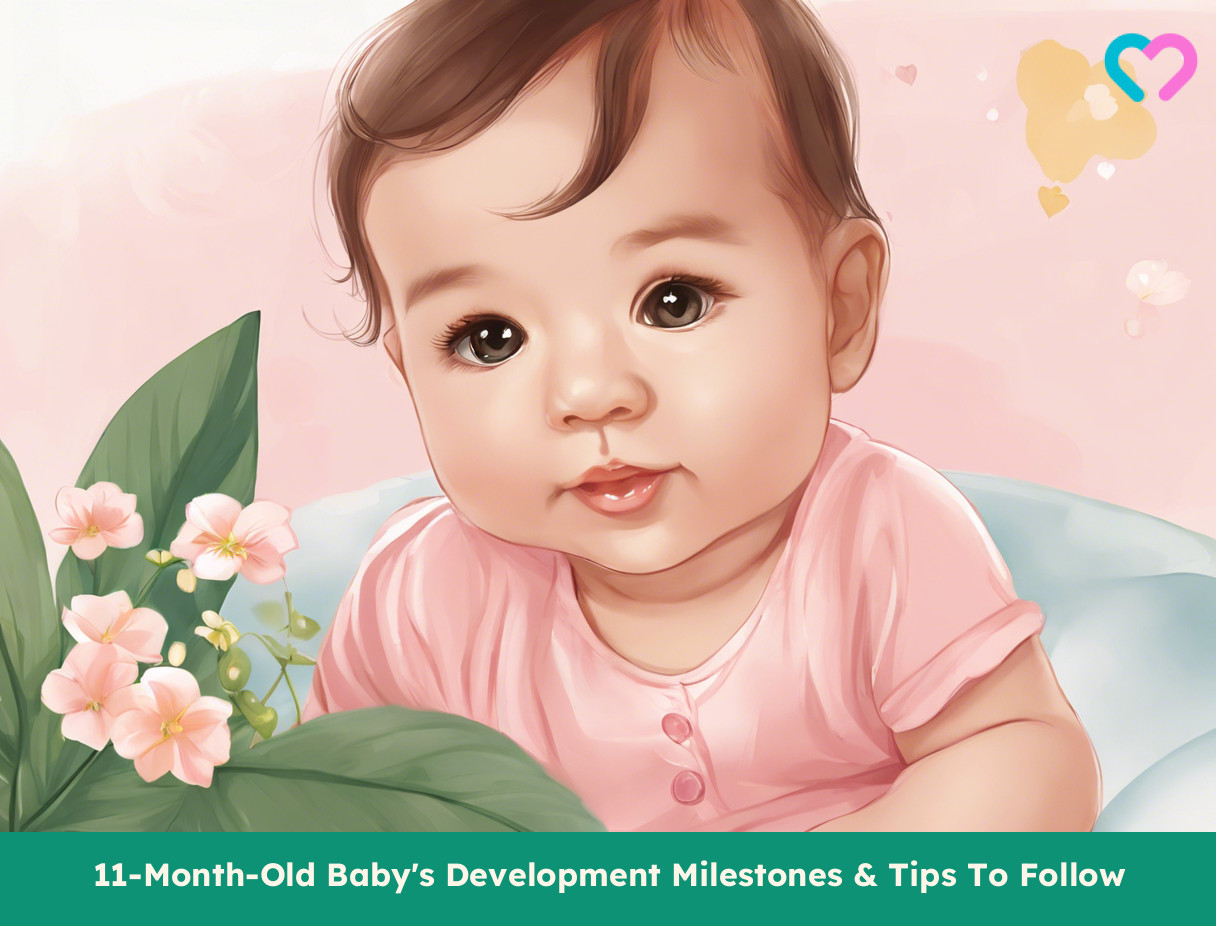
Image: Stable Diffusion/MomJunction Design Team
Witness the incredible journey of 11-month-old baby development milestones! Immerse yourself in this captivating video by Emma’s Diary and gain valuable insights on developmental milestones.
Personal Experience: Source
MomJunction articles include first-hand experiences to provide you with better insights through real-life narratives. Here are the sources of personal accounts referenced in this article.
i. Life With A Baby: 11 Months.https://ohsheglows.com/2015/09/07/life-with-a-baby-11-months/#
References
- First year infant development.
https://americanpregnancy.org/healthy-pregnancy/first-year-of-life/first-year-infant-development/ - 10-11 months: baby development.
https://raisingchildren.net.au/babies/development/development-tracker-3-12-months/10-11-months - Age-appropriate speech and hearing milestones.
https://www.hopkinsmedicine.org/health/conditions-and-diseases/hearing-loss/ageappropriate-speech-and-hearing-milestones - Teeth eruption timetable.
https://my.clevelandclinic.org/health/articles/11179-teething-teething-syndrome - Sleep in Infants (2-12 Months).
https://www.nationwidechildrens.org/specialties/sleep-disorder-center/sleep-in-infants - Helping baby sleep through the night.
https://www.mayoclinic.org/healthy-lifestyle/infant-and-toddler-health/in-depth/baby-sleep/art-20045014 - 11 Month Baby Sleep Regression – How to Deal With It
https://www.sleepadvisor.org/11-month-sleep-regression/ - Solutions to sleep concerns (11)- babies 6 to 10 months.
https://www.betterhealth.vic.gov.au/health/healthyliving/solutions-sleep-concerns-babies-6-12-months - Foods and Drinks to Encourage.
https://www.cdc.gov/nutrition/infantandtoddlernutrition/foods-and-drinks/foods-and-drinks-to-encourage.html#:~:text=Encourage%20Your%20Child%20to%20Drink,still%20breastfeeding - Feeding Your Baby: The First Year.
https://my.clevelandclinic.org/health/articles/9693-feeding-your-baby-the-first-year - Infant sleep and its relation with cognition and growth: a narrative review.
https://www.ncbi.nlm.nih.gov/pmc/articles/PMC5440010/ - Data Table of Infant Weight-for-age Charts.
https://www.cdc.gov/growthcharts/html_charts/wtageinf.htm





